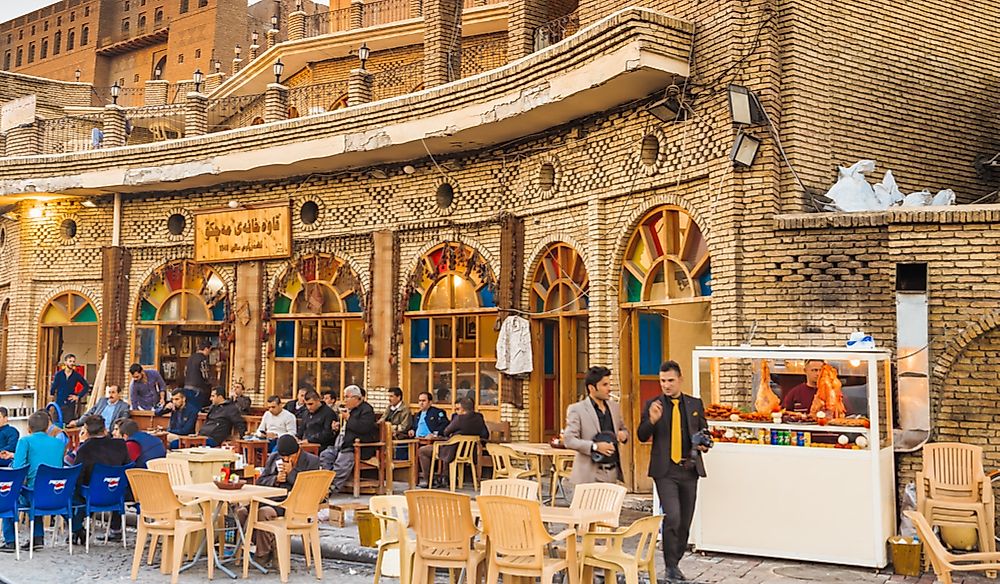The Culture Of Iraq

The Western Asian country of Iraq has a culture that has integrated the cultures of its diverse ethnic groups over a period of centuries. The country has one of the oldest cultural histories in the world. It has produced some of the best poets, painters, and sculptors in the Arab world. In the past, Baghdad, the capital of Iraq, was the Arab world's seat of cultural evolution. The Ancient Mesopotamian civilization originated in the region that now includes Iraq.
Ethnicity, Language, and Religion in Iraq
Today, Iraq is home to a population of around 40,194,216 people. 75 to 80% of Iraq’s population comprises ethnic Arabs. The Kurdish ethnic group represents 15 to 20% of the population. The rest include Turkmen, Yezidi, Romani, Assyrian, and others. Arabic and Kurdish are the official languages of Iraq. The distinct ethnic communities inhabiting the country also speak their own languages. Islam is the official religion of the state. Around 69% of the Iraqi Muslims are Shias while the rest are Sunnis. Christians account for only 1% of the population.
Cuisine of Iraq
Iraqi cuisine, also known as the Mesopotamian cuisine, is one of the world’s oldest cuisines. The first cookbooks in the world were produced in Iraq. The cuisine reached its peak during the Islamic Golden Age when Baghdad became the Abbasid Caliphate’s capital. Kebab is one of the most popular dishes of this cuisine. Grilled meat sandwich wrap called gauss, quzi (rice served with lamb, raisins, almonds, and spices), Masgûf (grilled fish cooked with tamarind and pepper), kubbah (spiced minced meat and bulgur), maqluba (rice, meat, and vegetable dish served upside down), etc., are some other typical dishes of the Iraqi cuisine. Arak (aniseed flavored distilled alcoholic drink) and beer are the most popular alcoholic beverages of Iraq. Coffee, tea or chai, sharbat (a chilled sweet drink made from flower petals or fruit juice), and Shinēna (a cold beverage made from water and yogurt) are the most widely consumed non-alcoholic beverages in Iraq.
Literature and the Arts in Iraq
Since the region that is now Iraq was part of advanced ancient civilizations like the Mesopotamian civilization, literature flourished there at a time when much of the world was in complete darkness. However, Iraqi literature in the truest sense refers to the literature of the modern sovereign nation of Iraq. It has been substantially influenced by the country’s tumultuous political history. Often, Iraqi writers and poets have been forced or coerced to produce literary works biased towards a particular political group or leader. Those that have done so have been rewarded with publications while others who did not give in to pressures were forced to leave Iraq.
Like literature, Iraqi art also reflects the influences of frequent political changes, war, and revolutions that characterize the country’s history since its birth. Baghdad, the capital of Iraq, was the hub of Iraqi art and culture for centuries. Islamic art and calligraphy is an important part of Iraqi art. Carpet weaving, ceramics, mosaics, etc., are some of the major crafts from the nation.
Performing Arts in Iraq
The music of Iraq is often called Mesopotamian music. It encompasses the traditional music of the diverse ethnic groups inhabiting the country like Assyrian, Kurdish, Turk, and Arabic music. It also includes the contemporary genres of music like pop, soul, and rock. The traditional music is heavily reliant on some musical instruments like the Oud, Joza, and Iraqi Santur. Sung poetry is one of the finest forms of Iraqi classical music.
Sports in Iraq
Football (soccer) is Iraq’s most popular sport. The country’s national football team has been quite successful in the past. Football is played both professionally and informally in the nation. Other games played in Iraq include basketball, boxing, bodybuilding, swimming, tennis, etc. Iraqi athletes have also participated in several Olympic Games since 1948. They have, however, won only one medal in the Olympics since entering.
Life in the Iraqi Society
Traditionally, Iraqi society has been patriarchal in nature. However, years of wars, revolutions, and political changes led women of the country to step outside, receive education, and earn jobs to replace men who were busy in fighting. Iraqi women were among the first ones in the Arab world to enter the world of politics in top positions. However, critics claim that such progressive steps were taken by the country’s government to gain international approval rather than to further the cause of women. At the societal level, however, the Iraqi society is still rooted in traditional values that prefer women to stay indoors and play the roles of obedient daughters and wives.
Traditionally marriages in the country were arranged and polygamy was the norm. However, such practices were on the decline prior to the Iraq-Iran war. The severe loss of men during the war led the government of the country to promote polygamy once again. The government also gave grants for men to marry war widows. Divorce in Iraq is legally allowed but men are mostly in charge of such decisions while it is almost impossible for a woman to initiate a divorce. Divorced women face many difficulties in society.
Households in Iraq are either extended or nuclear in nature with the latter more common due to economic difficulties in the war-torn nation. Families usually comprise of an elderly couple, their sons and their families, and unmarried daughters. The eldest male member often heads the family and his decisions on most matters are deemed final. Inheritance follows Islamic laws and sons inherit twice as much as daughters.
Children are the primary responsibility of the mother. Even working women and not men are expected to perform household chores and engage in childcare. Boys and girls are brought up differently and taught gender-based values. Boys are prized more than girls. Religious schools in the country are deemed important in the upbringing of children since religion shapes the way of life of the Iraqi people.











